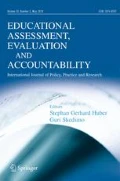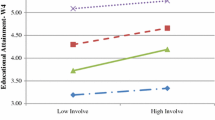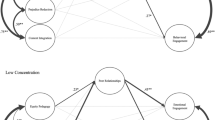Abstract
Traditionally political knowledge was regarded as an important potential outcome for civic education efforts. Most of the currently available research, however, tends to focus on non-cognitive goals, despite the fact that studies repeatedly have shown that political knowledge is an important resource for enlightened and engaged citizenship. In this article, we investigate whether civic education efforts at school contribute to political knowledge levels. The analysis is based on the Belgian Political Panel Survey, a 2 year panel study among 2,988 Belgian late adolescents. The analysis shows that experiences with group projects at school contribute significantly to political knowledge levels 2 years later on. Furthermore, we can observe an interaction effect as those who are already most knowledgeable about politics, gain most from these group projects. Classes about politics, on the other hand, did not have an effect on knowledge levels. In the discussion, it is argued that civic education can have strong cognitive effects, but that these effects are not always related to classical civic education efforts and we discussion the policy implication for civic education.
Similar content being viewed by others
Notes
The presence of the school council could not be included as a school level variable, as a 2004 Decree of the Flemish Community requires the presence of a school council at every school. As such, there is no variance in this regard at the school level, as by now all schools comply with this legal obligation.
References
Althaus, S. (2003). Collective preferences in democratic politics. Opinion surveys and the will of the people. New York: Cambridge University Press.
Andersen, R., Tilley, J., & Heath, A. (2005). Political knowledge and enlightened preferences: party choice through the electoral cycle. British Journal of Political Science, 35(2), 285–302.
Anderson, L., & Krathwohl, D. (Eds.). (2001). A taxonomy for learning, teaching and assessing: A revision of Bloom’s Taxonomy of educational objectives. New York: Longman.
Bennett, S. (1988). ‘Know-Nothings’ revisited. The meaning of political ignorance today. Social Science Quarterly, 69, 476–490.
Bloom, B. (1976). Human characteristics and school learning. New York: McGraw-Hill.
Campbell, D. (2008). Voice in the classroom: how an open classroom climate fosters political engagement among adolescents. Political Behavior, 30(4), 437–454.
Campbell, D., & Wolbrecht, C. (2006). See Jane run: women politicians as role models for adolescents. Journal of Politics, 68(2), 233–245.
Choma, B., & Hafer, C. (2009). Understanding the relation between explicitly and implicitly measured political orientation. The moderating role of political sophistication. Personality and Individual Differences, 47(8), 964–967.
Claes, E., Hooghe, M., & Stolle, D. (2009). The political socialization of adolescents in Canada. Differential effects of civic education on visible minorities. Canadian Journal of Political Science, 42(3), 613–636.
Converse, P. (1964). The nature of belief systems in mass publics. In D. Apter (Ed.), Ideology and discontent (pp. 206–261). Glencoe: Free.
Dalton, R. (2000). Citizen attitudes and political behavior. Comparative Political Studies, 33(6–7), 912–940.
Dassonneville, R. (2012). Electoral volatility, political sophistication, trust and efficacy: a study on changes in voter preferences during the Belgian regional elections of 2009. Acta Politica, 48, in press.
Delli Carpini, M., & Keeter, S. (1991). Stability and change in the U.S. public’s knowledge of politics. Public Opinion Quarterly, 55(4), 583–612.
Delli Carpini, M., & Keeter, S. (1996). What Americans know about politics and why it matters. New Haven: Yale University Press.
Dow, J. (2011). Political knowledge and electoral choice in the 1992–2004 United States Presidential Elections. Are more and less informed citizens distinguishable? Journal of Elections, Public Opinion & Parties, 21(3), 381–405.
Green, D., Aronow, P., Bergan, D., Greene, P., Paris, C., & Weinberger, B. (2011). Does knowledge of constitutional principles increase support for civil liberties? Results from a randomized field experiment. Journal of Politics, 73(2), 463–476.
Hart, D., Donnelly, T., Youniss, J., & Atkins, R. (2007). High school community service as a predictor of adult voting and volunteering. American Education Research Journal, 44(1), 197–219.
Highton, B. (2009). Revisiting the relationship between educational attainment and political sophistication. Journal of Politics, 71(4), 1564–1576.
Hooghe, M., Quintelier, E., & Reeskens, T. (2007). How political is the personal? Gender differences in the level and the structure of political knowledge. Journal of Women, Politics & Policy, 28(2), 115–125.
Hooghe, M., Quintelier, E., Claes, E., & Dejaeghere, Y. (2009). Technical report of the Belgian Political Panel Study (BPPS, 2006–2008). Leuven: University of Leuven.
Hooghe, M., Vissers, S., Stolle, D., & Valérie-Anne, M. (2010). The potential of internet mobilization. An experimental study on the effect of internet and face-to-face mobilization efforts. Political Communication, 27(4), 406–431.
Hox, J. (2010). Multilevel analysis. London: Routledge.
Jennings, M. K. (1996). Political knowledge over time and across generations. Public Opinion Quarterly, 60(2), 228–252.
Kahne, J., Chi, B., & Middaugh, E. (2006). Building social capital for civic and political engagement: the potential of high school civics courses. Canadian Journal of Education, 29(2), 387–409.
Lachat, R. (2007). A heterogeneous electorate: Political sophistication, predisposition strength, and the voting decision process. Baden-Baden: Nomos Verlag.
Langton, K., & Jennings, M. K. (1968). Political socialization and the high schools civics curriculum. American Political Science Review, 62, 862–867.
Larcinese, V. (2007). Does political knowledge increase turnout? Evidence from the 1997 British general election. Public Choice, 131(3), 387–411.
Luskin, R. (1987). Measuring political sophistication. American Journal of Political Science, 31(4), 856–899.
Michaud, K., Carlisle, J., & Smith, E. (2009). The relationship between cultural values and political ideology, and the role of political knowledge. Political Psychology, 30(1), 27–42.
Miller, M., & Orr, S. (2008). Experimenting with a “Third Way” in political knowledge estimation. Public Opinion Quarterly, 72(4), 768–780.
Milner, H. (2002). Civic literacy: How informed citizens make democracy work. Hanover: University Press of New England.
Mondak, J. (2001). Developing valid knowledge scales. American Journal of Political Science, 45(1), 224–238.
Nie, N., Junn, J., & Stehlik-Barry, K. (1996). Education and democratic citizenship in America. Chicago: University of Chicago Press.
Niemi, R., & Junn, J. (1998). Civic education: What makes students learn. New Haven: Yale University Press.
Ondercin, H., & Jones-White, D. (2011). Gender Jeopardy. What is the impact of gender differences in political knowledge on political participation? Social Science Quarterly, 92(3), 675–694.
Popkin, S., & Dimock, M. (2000). Knowledge, trust and international reasoning. In A. Lupia, S. Popkin, & M. McCubbins (Eds.), Elements of reason. Cognition, choice and the bounds of rationality. Cambridge: Cambridge University Press.
Prior, M., & Lupia, A. (2008). Money, time, and political knowledge: distinguishing quick recall and political learning skills. American Journal of Political Science, 52(1), 169–183.
Scheerens, J. (2011). Indicators on informal learning for active citizenship at school. Educational Assessment, Evaluation and Accountability, 23(3), 201–222.
Sidanius, J., & Lau, R. (1989). Political sophistication and political deviance: a matter of context. Political Psychology, 10(1), 85–109.
Slavin, R. (1994). Cooperative learning. Theory, research, and practice. Boston: Alwyn & Beacon.
Sturgis, P., Allum, N., & Smith, P. (2008). The measurement of political knowledge in surveys. Public Opinion Quarterly, 72(1), 90–102.
Tavits, M. (2006). Making democracy work more? Exploring the linkage between social capital and government performance. Political Research Quarterly, 59(2), 211–225.
Tilley, J., & Wlezien, C. (2008). Does political information matter? An experimental test relating to party positions on Europe. Political Studies, 56(1), 192–214.
Torney-Purta, J. (1997). Links and missing links between education, political knowledge, and citizenship. American Journal of Education, 105, 446–457.
Torney-Purta, J. (2001). What adolescents know about citizenship and democracy. Educational Leadership, 59(4), 45–50.
Wolak, J., & McDevitt, M. (2011). The roots of the gender gap in political knowledge in adolescence. Political Behavior, 33(3), 505–533.
Youniss, J., McLellan, J., & Yates, M. (1997). What we know about engendering civic identity. American Behavioral Scientist, 40(5), 620–631.
Youniss, J., & Yates, M. (1997). Community service and social responsibility in youth. Chicago: University of Chicago Press.
Acknowledgement
Ruth Dassonneville would like to acknowledge the generous support she received as a PhD candidate for the Flemish Research Fund (FWO-Flanders, Belgium). The authors thank the reviewers of this journal for their constructive suggestions.
Author information
Authors and Affiliations
Corresponding author
Appendix
Appendix
Rights and permissions
About this article
Cite this article
Hooghe, M., Dassonneville, R. The effects of civic education on political knowledge. A two year panel survey among Belgian adolescents. Educ Asse Eval Acc 23, 321–339 (2011). https://doi.org/10.1007/s11092-011-9131-5
Received:
Accepted:
Published:
Issue Date:
DOI: https://doi.org/10.1007/s11092-011-9131-5




